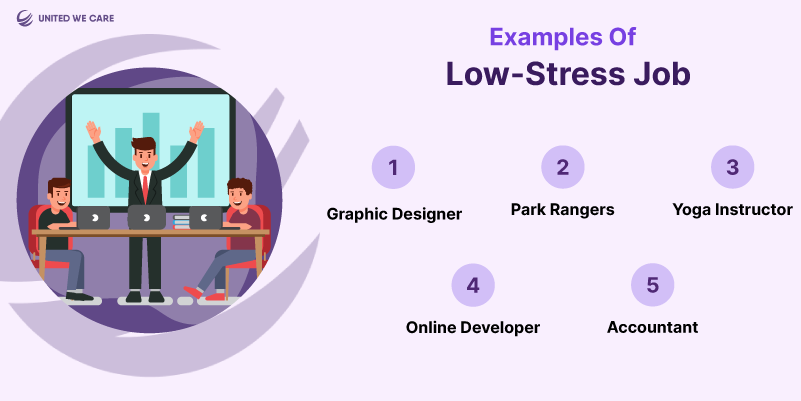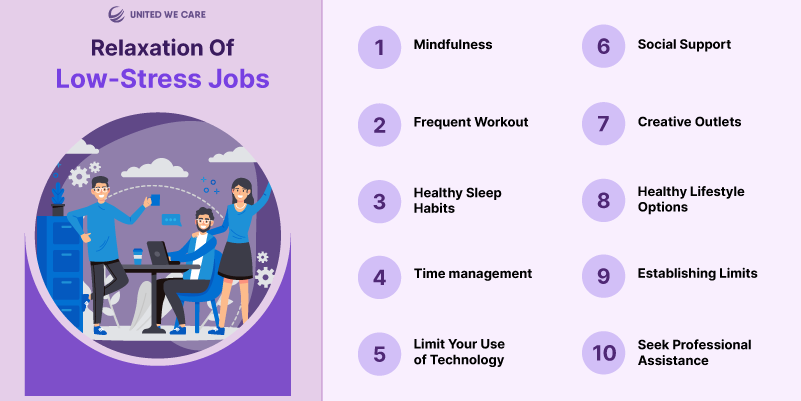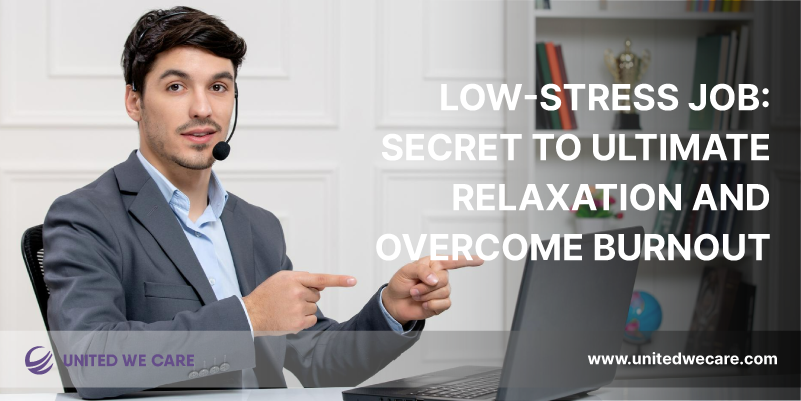Introduction
Stress at work is typically the result of too much pressure and is often disregarded. This can be resolved by identifying the distressing conditions at work taking the necessary steps to get in touch with our support networks and setting clear limits. Pressure from the workplace can lead to issues for the individual and the company.
Low-stress occupations frequently offer loose schedules, little pressure and a positive work atmosphere.
These positions can differ in salary and educational requirements, but overall, they provide a more laid-back atmosphere than high-pressure careers in industries like technology, healthcare or finance.
Symptoms of occupational burnout include feelings of energy depletion or exhaustion, increased mental distance from one’s job, feelings of negativism or cynicism related to one’s job and reduced professional efficacy.Occupational burnout is a phenomenon that arises from chronic workplace stress that hasn’t been successfully managed. It is categorised as a mismatch between the demands of the workplace and an individual’s physical and mental capabilities.
Examples of Low-Stress Job
Some examples of low-stress employment are:

- Graphic Designer: If you have solid time management skills and work for an organization with appropriate deadlines, designing graphics, logos, and other visual aspects can be creatively gratifying without going overboard with stress.
- Park Rangers: For people who value solitude and the great outdoors, maintaining park areas and helping guests can be low-stress jobs.
- Yoga Instructor: Being a yoga instructor may be a rewarding career that fosters wellbeing and relaxation. Additionally, you get to engage in the practice yourself, which has the potential to reduce stress.
- Online developer: Developing websites and online apps can be intellectually interesting. Additionally, a lot of web developers work remotely which helps relieve the stress of office politics and commuting.
- Accountant: Despite the frenetic nature of tax season, many accountants have relatively stress-free work environments the rest of the year, particularly if they are employed by a reputable organisation with manageable workloads.
Primary Responsibilities and Daily Tasks Associated with A Low-Stress Job:
Main Duties:
- Conservation and preservation – guarantee the preservation and protection of natural resources.
- Maintenance: Keep park amenities, pathways, and facilities in good condition so that visitors can enjoy them safely.
- Security: Monitoring Park areas to uphold laws and ordinances, guarantee the safety of visitors and stop criminal activity or damage.
Daily Task:
- Morning Briefing: Begin the day with a briefing about the state of the park, the predicted weather and any upcoming special events or activities.
- Trail: upkeep includes inspecting and maintaining trails, removing trash, fixing signage and making sure paths are secure for users.
- Interact with guests by responding to their inquiries, giving them directions and making suggestions for things to do or places to see.
- Environmental Monitoring: Test the quality of the water, survey the wildlife, and evaluate the flora among other environmental monitoring operations.
- Working as a park ranger generally entails a combination of outdoor activities, visitor contact, and environmental stewardship. These jobs may vary based on the park and its size, location and visitor demographics.
Effects Of Low-Stress Jobs
Your health, vitality, well-being, mental clarity, and interpersonal and professional connections can all be negatively impacted by stress, which can also lead to behavioral, emotional, and physical issues. In addition, it may result in defensiveness, a lack of drive, trouble focusing, mishaps, decreased output, and interpersonal strife amongst typically cordial coworkers.
Excessive stress can lead to relatively minor issues like headaches, backaches, irritability, and insomnia, as well as potentially fatal conditions like heart disease and high blood pressure.
It is often known that job stress negatively impacts both mental and physical health.
The following are some health impacts of working stress:
- musculoskeletal conditions
- cardiac conditions
- Both mental and emotional exhaustion
- Damage from discontent
- compromised immune system cancer
- suicidal ideas
- depression and anxiety
Low-Stress Jobs and Burnout–
Low-stress occupations often have good effects on workers’ general well-being, job satisfaction, and productivity. Everybody uses a different coping strategy.
Individuals’ overall job happiness and mental and physical health can benefit from low-stress jobs in a number of ways. Here are a few outcomes:
- Better Mental Health: By lowering the likelihood of burnout, depression, stress, and other mental health problems, working in a low-stress atmosphere can help improve mental health.
- Improved Work-Life Balance: Employees can have a healthy work-life balance when they have low-stress employment, which frequently has more predictable schedules and reasonable workloads.
- Enhanced Job Satisfaction: Because they don’t often suffer the same levels of irritation, tiredness, and unhappiness as those working in high-stress conditions, employees in low-stress occupations typically feel more content with their work.
- Enhanced Creativity and Productivity: People are more likely to be creative and productive when they are not under continual strain because they have more space to concentrate on their work and come up with novel solutions.
- Low-stress relaxation: Prolonged stress has been connected to several physical health concerns, including impaired immune system function, digestive disorders and cardiovascular disease. Low-stress occupations can lead to improved general physical health by lowering stress levels.
- Pleasant workplace connections: People who work in low-stress settings tend to experience more pleasant and healthier situations, which leads to improved connections with coworkers.
- Burnout can happen in every profession regardless of stress levels, even though low-stress jobs are typically linked to a lower risk of burnout than high-stress roles. Burnout is a complicated condition that can be brought on by a number of things other than job stress, like a lack of control, hazy expectations and low self-esteem. Here are some ways that low-stress employment might nonetheless lead to burnout.
- Boredom and Monotony: Certain low-stress occupations could include monotonous work or lack of challenge which over time can cause feelings of boredom and monotony. People who experience this deficiency in stimulation may become disengaged and unfulfilled in their work which can lead to burnout.
- Absence of Growth Opportunities: Low-stress occupations could be reliable and stable but they do not always present many chances for professional or career advancement. Employees who don’t feel like they have room to progress could feel disengaged and stagnant which raises the possibility of burnout.
- Poor Work-Life Balance: Even in low-stress positions, there may be expectations or rigorous schedules that negatively impact employees’ personal lives. Without a healthy work-life balance, people may get tired and run out of resources, which can lead to burnout.
- Toxic Work Environment: Burnout can be considerably increased in even low-stress occupations when there is inadequate leadership, a lack of support or interpersonal issues. Negative dynamics at work can be detrimental to an individual’s physical or mental well-being.
Relaxation Of Low-Stress Jobs:
The key to ultimate relaxation is not running away from stress completely but rather understanding how to deal with it. The solution is as follows:

- Mindfulness: Develop a regular meditation routine that focuses on mindfulness. This will enable you to respond to stressors more composedly by making you more conscious of your thoughts and feelings without passing judgment.
- Frequent Workout: Participate in frequent physical activity. Exercise boosts your mood and vitality by releasing endorphins, which are your body’s natural stress relievers.
The key to ultimate relaxation is not running away from stress completely but rather understanding how to deal with it. - Healthy Sleep Habits: Make great sleep your top priority by sticking to a regular sleep schedule, setting up a calming nighttime ritual, and making sure your sleeping space is comfortable.
- Time management: Establish reasonable goals and learn to prioritise your responsibilities. To prevent feeling overburdened, divide jobs into smaller, more doable chunks and assign them when needed.
- Limit Your Use of Technology: Cut back on screen time, especially right before bed. Screen blue light can disturb sleep cycles, raising stress levels.
- Social Support: Make sure you have a solid friendship and family network. Being able to rely on someone for assistance during trying times can greatly lower stress.
- Creative Outlets: Whether it’s writing, drawing, or performing music, find creative outlets in activities that make you happy and help you express yourself.
- Healthy Lifestyle Options: Limit alcohol and caffeine use, eat a balanced diet and remain hydrated. These routines promote resilience to stress and general well-being.
- Establishing Limits: To safeguard your time and energy, learn when to say no and set boundaries.
- Seek Professional Assistance: If you’re suffering from chronic stress or burnout, don’t be afraid to ask for help from a therapist or counsellor. They can offer useful resources and methods customised to meet your specific requirements.
Conclusion
Low-stress jobs and burnout can be death in a healthy way if we develop a healthy lifestyle, balanced work-life, set boundaries and enjoy our work. Having a creative mind and enhanced skills helps to improve the work we do and develops our knowledge in our field.
References
- Maslach C, Jackson SE, Leiter MP (1996). “MBI: The Maslach Burnout Inventory: Manual”. Palo Alto: Consulting Psychologists Press.
- Kristensen TS, Borritz M, Villadsen E, Christensen KB (2005). “The Copenhagen Burnout Inventory: A new tool for the assessment of burnout”. Work & Stress. 19 (3): 192–207. 3. Quick, James Campbell; Henderson, Demetria F. (May 2016). “Occupational Stress: Preventing Suffering, Enhancing Wellbeing †”. International Journal of Environmental Research and Public Health. 13 (5): 459
- Arnold B. Bakker & Juriena D. de Vries (2021) Job Demands–Resources theory and self-regulation: new explanations and remedies for job burnout, Anxiety, Stress, & Coping, 34:1, 1-21 5. Berkman, Lisa F.; Treder, Kathryn (2020), Theorell, Töres (ed.), “Work and Health”, Handbook of Socioeconomic Determinants of Occupational Health: From Macro-level to Micro-level Evidence, Handbook Series in Occupational Health Sciences, Cham: Springer International Publishing, pp. 53–70
- Michael Dickerson, PsyD. Licensed Clinical Psychologist. Expert Interview. 3 August 2021.
- American Psychological Association. (2020). Stress in America: A national mental health crisis.
- Attridge, D. (2017). Effects of work-related stress. University of Cambridge Human Resources.
- American Psychological Association. (2020). Stress in America: A national mental health crisis.










